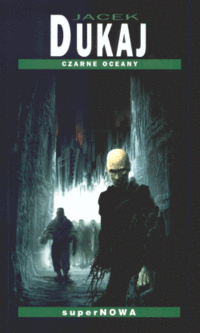- Czarne oceany
-
Czarne oceany 
Polish edition coverAuthor(s) Jacek Dukaj Original title Czarne oceany Translator not translated Cover artist Tomasz Bagiński Country Poland Language Polish Genre(s) Science fiction novel Publisher Supernowa Publication date 2001 Media type (Hardback & Paperback) Pages 494 pp ISBN 83-7054-149-6 OCLC Number 63517009 Czarne oceany (Polish: Black Oceans) is a novel written in 2001 by Jacek Dukaj, Polish science fiction writer and published in Poland by Supernowa. The novel fits in the hard science fiction genre, describing the late-21st century Earth facing technological singularity. The novel received the prime Polish award for sci-fi literature, Janusz A. Zajdel Award, for 2001.
Contents
The world
The year is around 2060. United States is still a leading power, but European and Asian powers are trailing close behind it. Technology has advanced, with biotechnological implants allowing people control over computers via brain-computer interfaces. Full immersion virtual reality is common, as well as 'Orto Virtual Reality' - mixing virtual reality with our reality, in effect 'skinning' our reality in a form of augmented reality. Much of the elite is genetically engineered as well, with AIs being increasingly common. In many ways this is a dark, cyberpunk-kind of a world.
However, the conflicts of this future era rely more on economics and market forces than sophisticated military hardware. In this world the stock market is the new battleground for nations and megacorps.
Technological trends are far from only ones explored by Dukaj in his book. He portrays the futuristic bureaucracy, political power struggles behind private sector, government and the military, and changes in culture. Dukaj extrapolates from the current trend of increasing lawsuits and political correctness: in his world many people willingly live under constant surveillance of the New Etiquette (NEti), which registers all their actions so that they couldn't be falsely accused of some "personal offense crime".
Plot summary
The main character, Nicholas Hunt, is an American politician and lobbyist, closely involved with some branches of secret military research including paranormal activities. He is not a hero: as Dukaj himself describes him, he is "a cynical, egoistic bureaucrat, whose main motivation for all of his decisions in his job is, it seems, covering his ass". Currently he has lost an internal power struggle and is assigned to oversee what seems like a dead-end, low-key project. Soon, however, his project starts to gain more importance, as scientists explore some promising theories from the borders of memetics and telepathy, including study of potential lifeforms that would use memes just as we use genes, and develop new sciences like psychomemetics.
Suddenly a strange cataclysm takes place, with millions of people worldwide going insane and many densely populated areas becoming a 'no-go' zone. Is this an alien invasion? A result of military or corporate experiment? A new step in human evolution? Or are we seeing the painful transformation into a post-technological singularity world? Nicholas Hunt is not sure, but he knows one thing: the rat race is going on, and he will do everything he needs to survive.
Trivia
The novel was cut down at the publisher's request from over 1000 pages to fewer than 500. The first seven chapters as well as several extra chapters which were cut from the printed versions are published free on Dukaj's website.
Quotes
- "Acceptance of an aesthetic of the evil is the first step to accepting the evil itself."
References
- 2003 Interview with Jacek Dukaj at Wotmania.com
- Reviews: [1], [2]
- (Polish) Description of book on Jacek Dukaj's page
- (Polish) Reviews: [3], [4], [5], [6]
External links
Categories:- 2001 novels
- Polish science fiction novels
- 2000s science fiction novels
Wikimedia Foundation. 2010.
